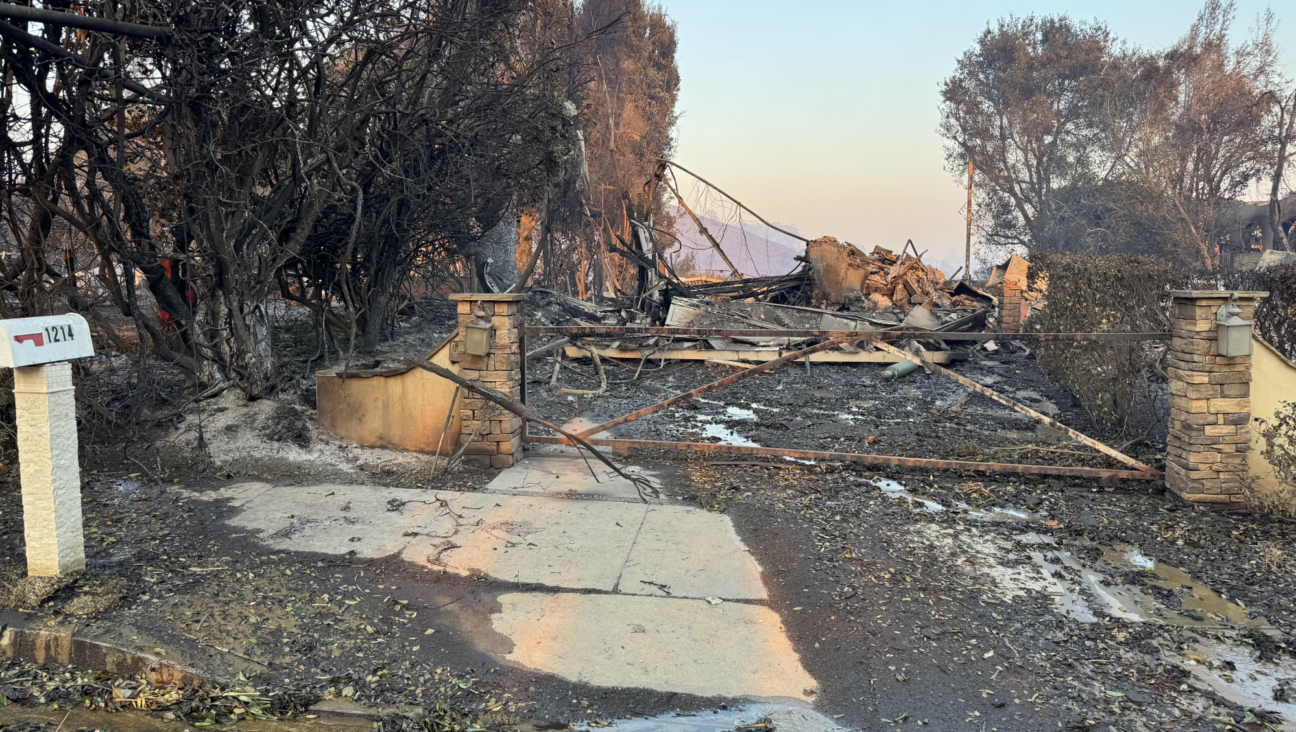Rosh Hashanah comes ‘early’ this year, but parents know what matters is the here and now

The author’s son Cielo, last Rosh Hashanah, in his new wool cardigan. Apples and honey! Courtesy of Ariel Foxman
Hang around even the most remotely observant Jewish people long enough, and you’ll likely hear us remark about how a given holiday is either early or late in the calendar. For instance, right now, it’s a fact that Jews in the Diaspora are bemoaning just how early Rosh Hashanah is this go-round. The Jewish New Year, which tends to fall in the latter part of the second half of September, will actually kick off on September 6 this year.
You see, the Jewish, or Hebrew, calendar is based on the lunar calendar. The lunar calendar has an average of twelve and a half lunar months per one solar twelve-month year on the Gregorian calendar. Jewish holidays are pegged to lunar calendar dates, and while those dates always occur around the same time seasonally, they are never fixed to actual solar dates. All this astronomy proves unstable and can sometimes even upset the rather fixed notions we may have of the supposed feeling of a holiday.
For instance, Rosh Hashanah is traditionally a holiday that feels like the arrival of fall. Kids debut new clothes in heavier fabrics and rich tones at High Holiday services. The festival’s focus on purpose and renewal jives well with the whole “back to school” vibe we all feel as September moves into high gear. And, of course, apples figure quite prominently.
But this year, the super-early timing won’t lend itself to that cherished, nostalgic Rosh mood. Landing on Labor Day, this Rosh Hashanah will inevitably feel bound up with summer-vacation energy. Too warm for wine-hued wool. Too languid for new beginnings. And while Starbucks has been selling its bellwether Pumpkin Spice Latte since August 24 this year, we’ll probably still have piles of apricots, not apples, in the crisper.
Nevertheless, the holiday persists. And that’s because it’s Rosh Hashanah’s content, not its context, that truly maters. When sundown caps off the Labor Day weekend on that Monday evening, Jews everywhere will switch hearts and minds over to the holiday’s primary preoccupations: joy, gratitude, love, and forgiveness. We will evaluate our actions and our intentions. We will think about the coming year and how we can ensure a sweet and peaceful outcome not only for ourselves and our families but also for the world at large. And while there will definitely be more shvitzing in shul this Rosh, our internal thermostats will delicately settle in at a temperate “reflect and chill”. What had been early will fade into the moment.
In the anticipation of something—a holiday, an event, an achievement—it’s tempting for us to fixate on normative expectations. Preconceived notions, usually not our own, provide some sort of standard for the community to evaluate whether or not something will be successful, recognizable, approved. Ironically, however, the lead up matters not at all once the happening happens. All that exacting baggage of how things ought to go disintegrates, burning up in the atmosphere of actual reality. What may have seemed so relevant, so important, now has no impact. Things are as they were meant to be simply because they are.
This tendency to latch into presuppositions is particularly strong amongst parents. Not surprising, right? I mean, the most-recommended book for new moms is quite literally titled “What to Expect When You’re Expecting.” We are encouraged not necessarily to support our children’s development as it unfolds organically but rather to match that development against averages and fixed measurements. How does my child compare? Is she on target? Are they lagging, or is he beating some sort of cumulative curve?
What’s always true though, no matter the noise, is that our children—all children—are realizing themselves as they are meant to be, in their own ways, and on their own timelines. The context will never trump the content. Just like the lunar calendar, kids will do their thing, regardless. External influences or overlapping grids can never hasten or hinder what is destined to happen ordinarily. We ought to think of ‘early’ and ‘late’ as unwelcome, judgmental distractions. It is our job, and privilege, as parents and people, to embrace the superior realness of the now, especially when our children exhibit it so purely. And I have decided that accepting and celebrating that will be my resolution for the coming year 5782.
Ariel Foxman is an award-winning editor, writer, and gay dad. This column is a part of his modern-parenting newsletter “ABBAPAPA”, which you can subscribe to on Substack.
A message from our Publisher & CEO Rachel Fishman Feddersen

I hope you appreciated this article. Before you go, I’d like to ask you to please support the Forward’s award-winning, nonprofit journalism so that we can be prepared for whatever news 2025 brings.
At a time when other newsrooms are closing or cutting back, the Forward has removed its paywall and invested additional resources to report on the ground from Israel and around the U.S. on the impact of the war, rising antisemitism and polarized discourse.
Readers like you make it all possible. Support our work by becoming a Forward Member and connect with our journalism and your community.
— Rachel Fishman Feddersen, Publisher and CEO
























